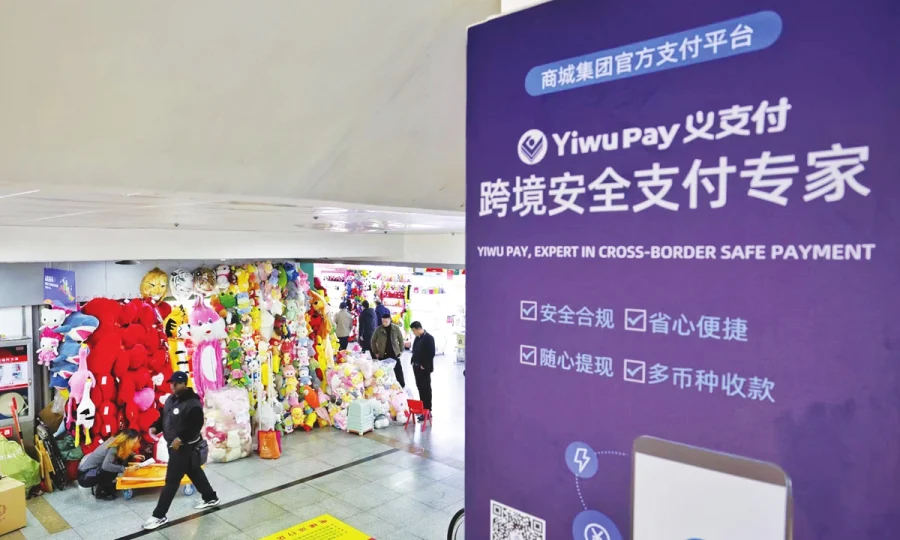With Christmas approaching, the Yiwu International Trade Market, the world’s largest small-commodities market, has transformed into a vibrant hub. Every day, foreign buyers flock to the market with their suitcases, eager to explore the vast array of goods on offer and navigate through the labyrinthine alleys, full of shops and stalls.
To further facilitate cross-border payment, Yiwu, located in East China’s Zhejiang Province, has developed a global payment platform, known as Yiwu Pay, in February to help further unleash the city’s market vitality and improve efficiency. The payment platform is helping local businesses expand overseas while facilitating global trade with a safer and more convenient payment experience, aiding the high-quality development of China’s foreign trade.
Trading across the globe
Officially launched in February 20, 2023, Yiwu Pay is a one-stop global cross-border payment platform. It supports 21 major currencies for international payment and settlement.
The platform is powered by a cutting-edge risk control system. It is able to carry out real-time monitoring on the whole transaction process and ensure secure transactions and payments for market entities, Zhang Wenjing, deputy general manager of the platform, told the Global Times on Monday.
Since its launch, Yiwu Pay has established partnerships with over 400 mainstream domestic and international banks, with services now covering more than 140 countries and regions, Zhang said.
The digital payment platform allows domestic factories to settle and transact their payment directly with foreign buyers, without going through the trading companies, the Global Times learned from vendors at the Yiwu International Trade Market.
“With this platform, I can now directly trade with foreigners without having to go through a trading company and pay commissions,” a vendor, making Christmas trees in Yiwu surnamed Sun, told the Global Times on Monday.
A growing number of export-oriented merchants in Yiwu have turned to this settlement of transactions, a Christmas costume maker in Yiwu surnamed Jiang told the Global Times on Monday.
“With Yiwu Pay, it’s quite convenient. I can receive payment in different currencies and then cash it out in yuan with a simple click on my cell phone,” Jiang said.
The transaction volume has grown exponentially and the payment platform has already settled approximately 4 billion yuan ($560 million). Businesspeople from countries participating in the China-proposed Belt and Road Initiative (BRI) rank high in terms of Yiwu Pay usage, Zhang said.
The increasing demand for cross-border payments closely aligns with the vitality and resilience of Yiwu’s foreign trade, which reflects the robust trade situation in China.
The market for cross-border payments is expanding rapidly, and we wanted to tap into this growing market, Zhang said. Additionally, as the largest small-commodity distribution center in the world, Yiwu has a high degree of export orientation, making it an ideal location for us to launch the platform, Zhang said.
According to statistics published by Yiwu Customs, the total import and export value of Yiwu in the first three quarters of 2023 reached 432.1 billion yuan, a year-on-year increase of 22 percent. Yiwu’s import and export value with countries participating in the BRI reached 264.99 billion yuan, a year-on-year increase of 24.8 percent.
Yuan internalization
The launch of Yiwu Pay also helps foreign buyers with limited access to US dollar reserves.
According to Zhang, the platform supports local currency trade between yuan and currencies include Philippine peso and Indonesian rupiah. This allows foreign buyers to reduce the risk of exchange rate fluctuations and lower the transaction cost. The growth on the Yiwu Pay reflects the momentum of the internationalization of yuan.
According to data released in September by the Society for Worldwide Interbank Financial Telecommunication (SWIFT), the global payment share of the yuan has increased from 3.9 percent at the beginning of the year to 5.8 percent, surpassing the euro for the first time.
In recent years, China has been focusing on promoting the internationalization of the yuan. The country has signed bilateral currency swap agreements with central banks or monetary authorities of 40 countries and regions, according to the 2023 Yuan Internationalization Report issued in October by the People’s Bank of China, the country’s central bank. Currently, there are 29 effective agreements with a swap scale exceeding 4 trillion yuan.
“In the future, we will continue to grow and invest in digital technology and diversify our trade currencies to meet the payment needs of global trade, specifically for Latin America, Middle East, and Southeast Asia,” Zhang said. “We will focus on these regions and support more niche currencies to cater to the growing trading demand.”










